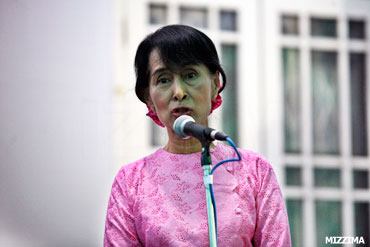When Aung San Suu Kyi speaks of “freedom from fear,” she is not only speaking to the people she is also speaking to the army that her father helped found.
 She wants, most of all, the army to stop seeing the people of Burma as enemies – out of fear. And while taking an enormous gamble, she joined the junta’s Parliament to reassure the military that in her vision for democracy in Burma, she wants to represent the military as well.
She wants, most of all, the army to stop seeing the people of Burma as enemies – out of fear. And while taking an enormous gamble, she joined the junta’s Parliament to reassure the military that in her vision for democracy in Burma, she wants to represent the military as well.
In the future, even assuming that democracy is restored in Burma by a transfer of power to the civilian government, the task of restructuring the economy by privatization pose sthe most difficult problem. How to dismantle the decades old supra governmental state enterprises and end the entrenchment of economic power in the hands of the former military commanders and their families will not be easy.
One of the toughest problems in developing countries lies in the relative weakness of the rule of law, and the emergence of a capitalist economy is broadly dependent on the prior existence of a rule of law.
Unfortunately for Burma, even if the Naypyitaw government successfully changes the Constitution, if the power elites of the army cannot be constrained under the rule of law, there will be no security for the people or their property to propel economic prosperity in Burma. Evidently, as Suu Kyi has said, the rule of law exists only when individuals who hold political power feel bound by the law.
Alarmingly, the Naypyitaw generals recently declared their renewed commitment to defend the 2008 army supremacist Constitution, which they term as the Burmese way to a disciplined flourishing democracy. Like many times before, the names and faces have changed, but the core values of military rule remains.
This should trouble the international community, even as they are softening their approach toward Burma
At the moment, Suu Kyi brings her innate ability to transcend politics and her reverence for the deeply held cultural and religious values of Burma. Suu Kyi and her father’s legacy could help put an end to the wars against the ethnic nationalities if a genuine peace agreement can be implemented with provisional changes in the Constitution to protect the ethnic people’s political rights.
In addition, to rebuild a viable political institution in Burma, the government must stop meddling in the country’s religious affairs, for Buddhism continues to be a powerful legitimizing institution in Burma. Also, the government must reopen all the major university campuses and restore the rights of the students to organize, since the studeny unions play an enormous part in bolstering Burma’s political institutions.
Burmese people and the world have shown good will toward the junta’s recent efforts to open up the country. But to encourage further cooperation from the world’s leaders, the government must immediately release all political prisoners and immediately cease armed conflicts with all ethnic nationalities.
While Suu Kyi and her party’s position in Parliament is still only symbolic, Burma’s dire economic condition and staggering poverty are real.
Unless the great economic inequality and the lack of opportunity for youth are addressed urgently, Suu Kyi will not be able to stem the tide of popular anger against the ruling elites, similar to the 1988 and 2007 unrest in Burma.
Burma’s only choice now is peace and hope instead of fear and violence. Someone like Suu Kyi does not come along very often. We must all abandon our fear and take advantage of this once in a lifetime opportunity to embrace freedom and democracy.



